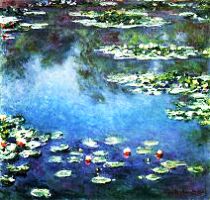|
The American Transcendentalists and their Relationship
to Andreas van der Mouw
Historically, prior to Andreas van der
Mouws incursions into the sacred Vedic texts, there had flourished in America the Transcendentalist Movement, from the 1830s
to the 1850s or thereabouts. This movement was spearheaded by the great American writers, David Henry Thoreau, author of
Walden Pond
and Ralph Waldo Emerson, who was truly one of America's greatest
19th. Century poets. There can be little doubt that the underlying and implicit connections, even though they are most likely
merely accidental, between these American writers and van der Mouw's own perceptions of the Universal Spheres mirrored one
another with remarkable fidelity.
One of Emerson's most inspired and most exquisite poems
is his, Brahma, which is cited here, even though it is not a sonnet, in order to illustrate
the strong spiritual linkage between the American Transcendentalist Movement and van der Mouw's own philosophical penchant.
IF the red slayer think he slays,
Or if the slain
think he is slain,
They know not well the subtle ways
I keep, and pass, and turn again.
Far or forgot to me is near;
Shadow and sunlight
are the same;
The vanished gods to me appear;
And one to me are shame and fame.
They reckon ill who leave me out;
When me they fly,
I am the wings;
I am the doubter and the doubt,
I am the hymn the Brahmin sings.
The strong gods pine for my abode,
And pine in vain
the sacred Seven;
But thou, meek lover of the good!
Find me, and turn thy back on heaven.
Ralph Waldo Emerson
(1803-1882)
You may also wish to read this commentary on Emerson's
profoundly transcendentalist beliefs, firmly based on the fundamental tenets of Hinduism at:
Emerson's Understanding of Hinduism
|





